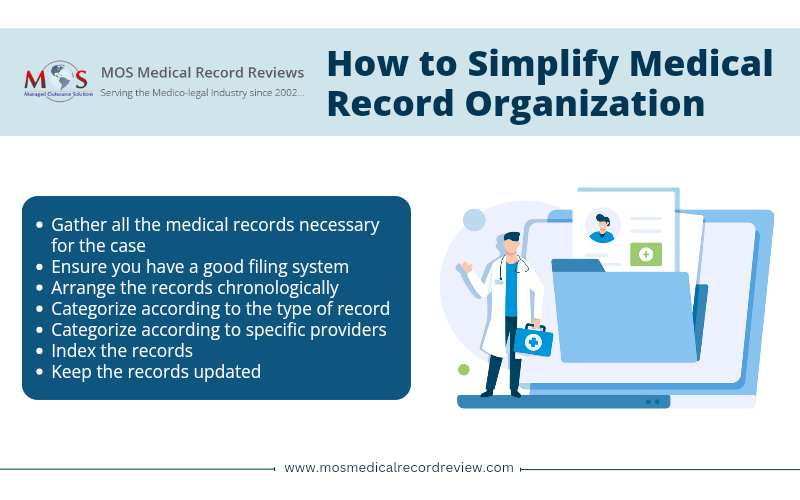Medical record analysis and chronology preparation are very important processes when it comes to cases that involve injuries or illnesses. Attorneys need powerful tools to organize the voluminous medical records and review them effectively. The medical data retrieved from the records enables them to quickly identify key medical encounters and events that are central to the case. This data needs to be arranged according to the sequence of events in an accurate timeline so that the attorney can clearly understand the various medical aspects of their case. When the medical records are well-organized, they enhance efficiency and minimize the risk of errors or omissions. Moreover, it helps ensure legal and regulatory compliance and excellent protection for patient data.
MOS provides customized medical review services for attorneys.
The first and foremost requirement is to ensure that you have a clear idea of the injured plaintiff’s complete medical history. This will help in placing requests for the complete set of medical records from various providers who may have treated the plaintiff. The medical billing records are also necessary, and provide details and contact information of the treating physicians. You have to make separate requests for the medical records and the billing records.
Medical Record Organization – Key Considerations
To have properly organized medical records with clear timelines, you need to consider the following significant aspects.
- Obtain all the relevant medical records: This is a time- and labor-intensive process which is best entrusted to professional medical record review services. It will also help make sure that you get all the records you need to develop the legal argument. The records have to be obtained from all the treating physicians and facilities. The documentation would include hospital records, lab results, imaging records, prescriptions and so on.
- Have a good filing system: Whether storing the records digitally or physically, you should have a folder dedicated solely to the medical records for the particular case. Separate folders can be assigned for different providers or the document types. This will ensure that all documents are kept properly organized.
- Arrange the records chronologically: This is the best way to create a correct timeline of the various medical events or encounters. The patient’s history is presented in a clear and logical order. Chronological arrangement is advantageous also because it becomes easy for the attorney to identify key events, trends etc. and create an accurate timeline regarding the care provided to the patient.
- Organize according to the type of record: The record types include progress notes, lab results, imaging studies and so on. You can sort the records in this manner to make it easy to access specific information.
- Organize according to specific providers: The records from a particular provider can be grouped together. This facilitates extracting information from that particular source.
- Index the records: Indexing comprises providing short descriptions of each document, with its location within the file. Indexing gives you easy access to the data you want, and also a clear idea of the plaintiff’s medical history that is relevant to your case.
- Keep the records updated: As the case progresses, the plaintiff may receive more medical records. You have to take special care to update the records and keep them organized. This is vital to support the case or claim.
AI-assisted Tools for Easy Organization of Medical Records
Now, advanced software systems are available that can assist lawyers and their legal teams in easily capturing and managing medical records right from intake to discovery. Modern tools enable attorneys to organize and review medical records effectively. They can quickly identify key medical events, and obtain accurate timelines. Moreover, these tools also help annotate and reference records within the platform, thus speeding up and streamlining the creation of comprehensive and reliable medical chronologies and summaries. With advanced technology and AI-assisted tools, attorneys can more easily see the connections between various medical events and better use their legal knowledge. Whether created with outsourced medical record analysis or with the support of AI-assisted tools, medical chronology and legal case timelines are valuable for attorneys.
Outsource your medical documentation review needs to MOS Medical Record Reviews.
Benefit from enhanced case insight!





